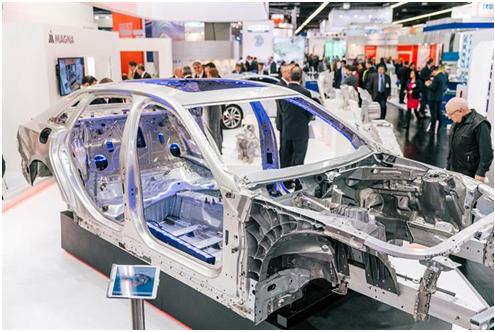
Pressure die-cast parts made from aluminium and magnesium alloys are increasingly in demand by the automobile industry, because they contribute to reduce the weight of vehicles, have many beneficial properties and can be produced at favorable costs. Also pressure die-cast parts made from zinc have their established place in the automotive sector.
Innovation pressure
In every national economy, the automobile industry is one of the most important drivers of innovation. This also affects the pressure die-casting industry. According to a market survey on the German foundry industry, which is among the leading foundry industries in Europe, three quarters of the pressure die-castings produced by it are sold to the automobile industry [1]. The global market for such parts had a value of nearly USD35 billion in the year 2015 and is expected to grow at a CAGR of nearly 7% up to more than USD48 billion by the year 2021. The metals which are used for these parts are mainly aluminium with a share of more than 65%, magnesium (nearly 19%) and zinc (a bit more than 9%) [2].
Light weight solutions
The initially mentioned market survey says about the importance of pressure die-casting for the automobile industry that the pressure of the car makers can also be seen as an investment driver of the sector because it accelerates the technological progress resulting in new materials and processes. Regarding the importance of pressure die-casting, Dr. Frank Dreves, the former head of production planning at the car manufacturer Audi, said that compounds made by pressure die-casting are a key element of Audi’s light weight strategy [3]. The core idea of the ongoing demand of the car makers for light weight is the reduction of the vehicle weight aiming at reducing the fuel consumption of vehicles with combustion engines and the emission of harmful exhaust gases. In the case of cars with alternative powertrains, light weight helps compensate the weight of electric motors, batteries and further components. Light weight solutions consist of the optimum combination of materials with different properties complementing each other in an ideal manner. Therefore, the demand for pressure die-castings made from aluminium and magnesium alloys is growing as they for natural reasons have a relatively low self-weight, can be formed into complex parts and manufactured at relatively low costs.
Application examples
Typical pressure die-castings made from these metals are engine components, gearbox housings, structural and chassis parts, door reinforcements, and tailgate frames. In an aluminium die casting competition, which for a long times has been belonging to the program of the EUROGUSS trade fair, the car maker BMW was awarded for a tailgate made by aluminium pressure die-casting. The component foreseen for a car model of the BMW 5 Series weighs 11.6 kg and is therefore 13 kg lighter in comparison with a structure made from deep-drawn steel sheets. Even greater weight savings can be achieved by using magnesium. With a specific density of 1.74 g/cm³, magnesium is one third lighter than aluminium (2.75 g/cm³) and being used more widely for applications in the automotive sector as it is with BMW (Fig. 1). Also in the case of a car type Opel Vectra the dashboard support was replaced by a pressure die-casting made from magnesium. In comparison to the previous construction – a complex formed steel tube with welded deep-drawn steel sheets – the weight was reduced by nearly 5 kg, and the manufacturing process was considerably simplified.
Another example is a 5 kg seat frame made from steel. This part was replaced by a pressure die-casting made from magnesium whose weight is only 1.8 kg and therefore 64% lighter [4]. Zinc is another metal which is processed into automotive parts by pressure die-casting. About 28 % of all zinc parts produced by pressure die-casting are destined for vehicles, for example door lock housings, pawls, take-up systems for safety belts, pump housings and housings for electrical systems. Although the material having a specific density of 7.14 g/cm³ is one of the heavy metals like copper and steel, its advantages are characteristics such as a favourable strength weight ratio, a good castability, a relatively low casting temperature (about 430 °C) and a good shielding against electromagnetic fields.
-

- Magnesium alloy die-casting LED display frame
-

- ای بائک انٹیگریٹڈ فریم کے لیے اپنی مرضی کے مطابق فاؤنڈری پراڈکٹس ہائی پریزین ڈائی کاسٹنگ پارٹس
-

- Magnesium Aluminium alloy die casting parts Chain cover for automotive
-

- Custom-made die casting parts&comopnents for bicycle suspension fork for MTB
-

- Magnesium alloy foundry parts bicycle wheel with CNC machining & surface finishing
-

- اعلی صحت سے متعلق میگنیشیم تھیکسومولڈنگ اجزاء لیپ ٹاپ ہاؤسنگ کور A

 0086-750-5616188
0086-750-5616188 +86 13392089688
+86 13392089688 sales@zhongmei-tech.com
sales@zhongmei-tech.com







